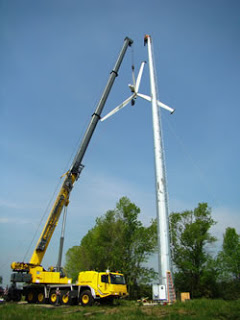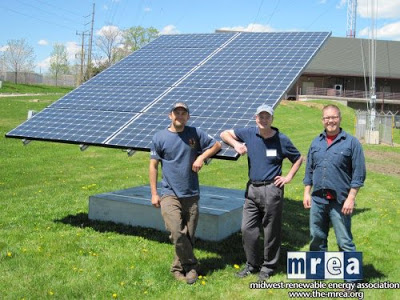
by jboullion | Jul 1, 2010 | Uncategorized

A 50 kW Entegrity wind turbine is installed May 26 on Lakeshore Technical College’s Cleveland campus. The turbine was made operable June 8 and is visible from I-43.
From a news release issued by Lakeshore Technical College:
A second wind turbine is up and running on Lakeshore Technical College’s Cleveland campus, providing additional opportunities for student training and field testing, as well as energy savings for the college.
The 120-foot, 50 kW Entegrity turbine is located just northwest of the LTC Flexible Training Arena. It was installed May 26 with the help of Seventh Generation Energy Systems, and was made operable June 8 following final interconnection tests and inspections by We Energies.
The Entegrity is expected to produce between 75,000 and 91,900 kWh annually — slightly more than the Vestas V-15 turbine, which was erected on campus in 2004. A third turbine, a 50 kW Endurance, will be installed at LTC later this summer.
“The main point of the project is the head-to-head comparison of these three models for energy production, maintenance costs, installation costs and other factors,” said Doug Lindsey, LTC’s dean of Trade and Industry. “We Energies has a strong interest in providing consumer-level field test data on these turbines.”
Regular maintenance on the Entegrity will be performed by second-year students in the Wind Energy Technology associate degree program.
While the two existing turbines — the Vestas and the Entegrity — are similar in size, Wind Energy Technology Instructor Jenny Heinzen said individuals visiting or passing by the campus will notice one key difference.
“The Entegrity is a downwind machine, which means it operates with its blades facing away from the wind,” Heinzen said. “Because the Vestas operates by pointing into the wind, the two will appear to be positioned in reverse directions while operating simultaneously.”
by jboullion | Jun 29, 2010 | Uncategorized
From an article by Tom Content in the Milwaukee Journal Sentinel:
Tower Tech Systems of Manitowoc will build 90 steel towers for Wisconsin’s largest wind farm, as We Energies adds a “buy-local” flavor to its renewable energy project near Madison.
The Manitowoc maker of wind turbine towers will build the 262-foot tall towers for turbine maker Vestas. The turbines will be erected next year in Columbia County at the $367 million Glacier Hills Wind Park.
The move comes as European companies like Vestas and Ingeteam look to expand their domestic production of wind power components.
Ingeteam last week broke ground on a $15 million wind power generator factory in Milwaukee’s Menomonee Valley.
For its part, Vestas is ramping up production of turbines, blades and towers at factories in Colorado.
But for this project, Vestas opted to work with Tower Tech Systems, a Manitowoc company that’s part of the wind component firm Broadwind Energy Inc. Including factories in Texas and South Dakota, Tower Tech is the third largest producer of wind towers in North America.
The value of the contract hasn’t been disclosed, but Chief Operating Officer Paul Smith said it will mean job security for employees at the sprawling Tower Tech complex near Lake Michigan.
As wind project development slowed because of the recession, Tower Tech laid off workers. But this contract and other orders placed by Vestas will enable Tower Tech, now employing 160, to bring back about 60 to 80 workers from layoff in the coming months, Smith said.
by jboullion | May 18, 2010 | Uncategorized
From a blog post by Tom Content on JSonline:
Energy Composites Corp. will receive $45 million of tax-exempt bonds to assist in the construction of its wind power blade factory in Wisconsin Rapids, Gov. Jim Doyle’s office announced.
The company is receiving Recovery Zone Facility Bonds, which the facility is eligible for under a law that passed earlier this year that allows the state to maximize federal bonds to help fund projects.
Energy Composites, which employs 67 people, projects that its expansion will create up to 600 jobs.
The company’s factory is designed to produce up to 1,500 utility-scale wind blades per year, for use in both onshore and offshore wind farms.
Energy Composites said in a statement that it has completed the purchase of land in Wisconsin Rapids for its new factory. Two different properties were acquired — a 54-acre parcel for the 535,000-square-foot factory and a 41-acre parcel for the company’s logistics center.
The $54.4 million investment will be the first factory in North America designed to produce blades up to 65 meters long, which could position the company to deliver blades for large turbines both on land and offshore, according to the governor’s office.
Site improvements by the city of Wisconsin Rapids are under way, and the city has committed $7.5 million in development incentives toward the project.
by jboullion | May 17, 2010 | Uncategorized
From an article by Tom Content in the Milwaukee Journal Sentinel:
Crews will begin site preparation next week for the largest wind farm in Wisconsin, after state regulators finalized plans for the Glacier Hills Wind Park northeast of Madison.
We Energies of Milwaukee said it will erect 90 turbines at the wind farm, two more than it installed on its first large wind farm, near Fond du Lac, in 2008.
The cost of the Glacier Hills project came in at $367 million, utility spokesman Brian Manthey said. By comparison, the 88-turbine Blue Sky Green Field wind farm that opened two years ago cost $295 million.
The tab for We Energies’ customers isn’t yet known, but the company will seek to collect construction costs from ratepayers beginning in 2012, Manthey said.
Friday’s announcement came after the state Public Service Commission approved the sale of two Columbia County homes to We Energies. Both homes would have had at least nine turbines within one-half mile, and the commission directed We Energies to negotiate with the two property owners.
We Energies also had to reconfigure its turbine layout after the commission established bigger setbacks from the turbines for neighboring property owners than the utility had proposed.
Those larger setbacks addressed concerns about noise and shadow flicker – a phenomenon created by wind turbines’ rotating blades. The Coalition of Wisconsin Environmental Stewardship had raised concerns about the impact of turbines on property values and homeowners’ qualify of life.
The project is expected to be completed by late 2011 and generate 162 megawatts of power, or enough over a year’s time to supply 45,000 typical homes.
Both projects are needed to help diversify the utility’s energy mix and add more renewable power to comply with the state mandate requiring 10% of Wisconsin’s electricity to come from wind turbines, landfill gas projects and other types of renewable power by 2015, up from 5% this year.
Vestas Wind Systems is supplying turbines to We Energies for the Glacier Hills project, after supplying 88 turbines for the Fond du Lac County project.
Three Wisconsin firms have been hired to handle the project’s construction: The Boldt Co. of Appleton; Michels Corp. of Brownsville; and Edgerton Contractors of Oak Creek.

by jboullion | May 11, 2010 | Uncategorized

Nick Matthes and Ed Stoll of Pieper Electric (who will be installing the PV), flank Rich Hinkelman of Solar Systems Inc (who build the racking for the system). All are MREA supporters and Energy Fair exhibitors!
From a post on Tom Content’s blog on the Milwaukee Journal Sentinel site:
Leaders at Milwaukee Area Technical College kicked off the construction of the largest solar project in the state with a groundbreaking ceremony Wednesday afternoon north of Capitol Drive.
The solar project — dubbed the Photovoltaic Educational Farm — will be developed on a former landfill along the Milwaukee River, underneath the television tower for MPTV, Milwaukee Public Television.
The project will feature nearly 2,600 solar panels from four different manufacturers, in eight different configurations. It’s scheduled to be completed in August.
The aim of the project is to showcase a variety of renewable energy technologies, as well as provide training in solar field to students at MATC as well as Milwaukee’s three engineering schools, said Brad Bateman of Johnson Controls.
“This will be a testing and training platform unlike any other in the country,” he said.
The project is projected to generate enough power to make the TV transmitter for MPTV the first of any public television station in the country to be powered with renewable energy. MPTV projects energy savings of at least $70,000 in its first year of operation.
The project will employ 150 people, said Sargent.
Johnson Controls Inc. is the technical college’s partner and general contractor on the project, which includes 14 other firms — 13 of them from Wisconsin.

 A 50 kW Entegrity wind turbine is installed May 26 on Lakeshore Technical College’s Cleveland campus. The turbine was made operable June 8 and is visible from I-43.
A 50 kW Entegrity wind turbine is installed May 26 on Lakeshore Technical College’s Cleveland campus. The turbine was made operable June 8 and is visible from I-43.
